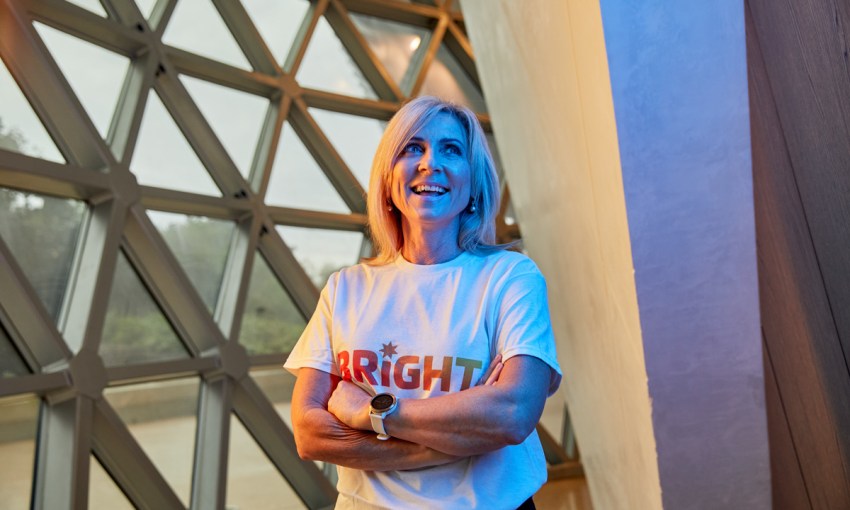Meet the people working to keep us all healthy.
SAHMRI is a hive creating better health in South Australians
Blink, and you might miss SAHMRI’s Dr Johan Verjans, scurrying from room to room.
As a clinical heart specialist, researcher and expert in use of artificial intelligence for healthcare, Johan is constantly on the go. If you’re lucky, you might catch him at his desk on Level 6 or performing heart imaging on the ground floor at SAHMRI.
But Johan also ducks across to the Royal Adelaide Hospital for patient consultations and is known to grab an e-scooter to zip down North Terrace to meet with university collaborators. If time allows, he’ll grab a quick coffee by Karrawirra Pari, the River Torrens.
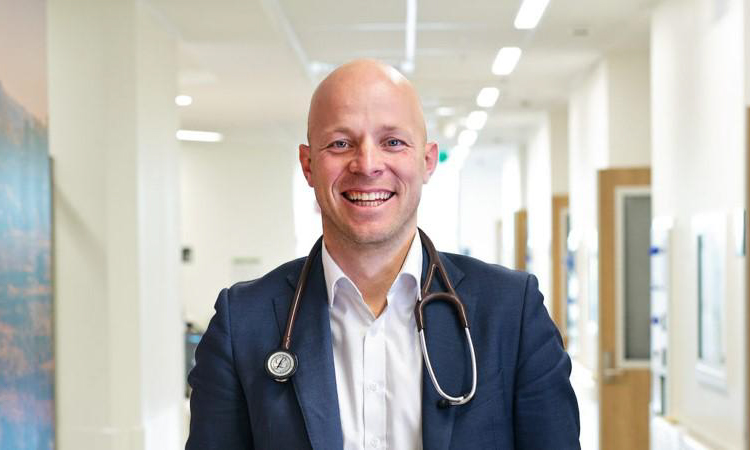
Johan Verjans in a rare still moment
Read more about Johan Verjans’ work here.
SAHMRI is known as the cheese grater – but the buzzing activity of its people give the building strong beehive vibes.
“I work hard, but I love what I do,” Johan shrugs.
Trained in the Netherlands, Johan moved to Adelaide in 2017 when he was appointed a leader within the Lifelong Health Theme at SAHMRI.
“I was offered similar positions in Europe and Sydney, but for my wife and I, with two young children it was a no-brainer to come to Adelaide.”
Johan’s research aims to discover new indicators of heart disease, particularly use of artificial intelligence to identify patterns in medical images that can aid with diagnosis. He also works on new tools for clinical use, such as tiny catheters with integrated microscopes to view damaged blood vessels.
“We hope our projects can help predict, diagnose and guide treatment of heart disease, in particular heart attacks,” Johan says.
Every day, Johan and his SAHMRI colleagues make use of the building’s desks and laboratory spaces, themed research areas, meeting rooms and vital infrastructure to conduct research that is informed by the latest knowledge and technology. They travel in and out of the building to work with hospitals, pathology services and patients to ensure their research is connected to real clinical care.
SAHMRI staff include scientists, doctors, nurses, study coordinators and administrators. All work for health impact not profit, thanks to grants and vital donations from the public.
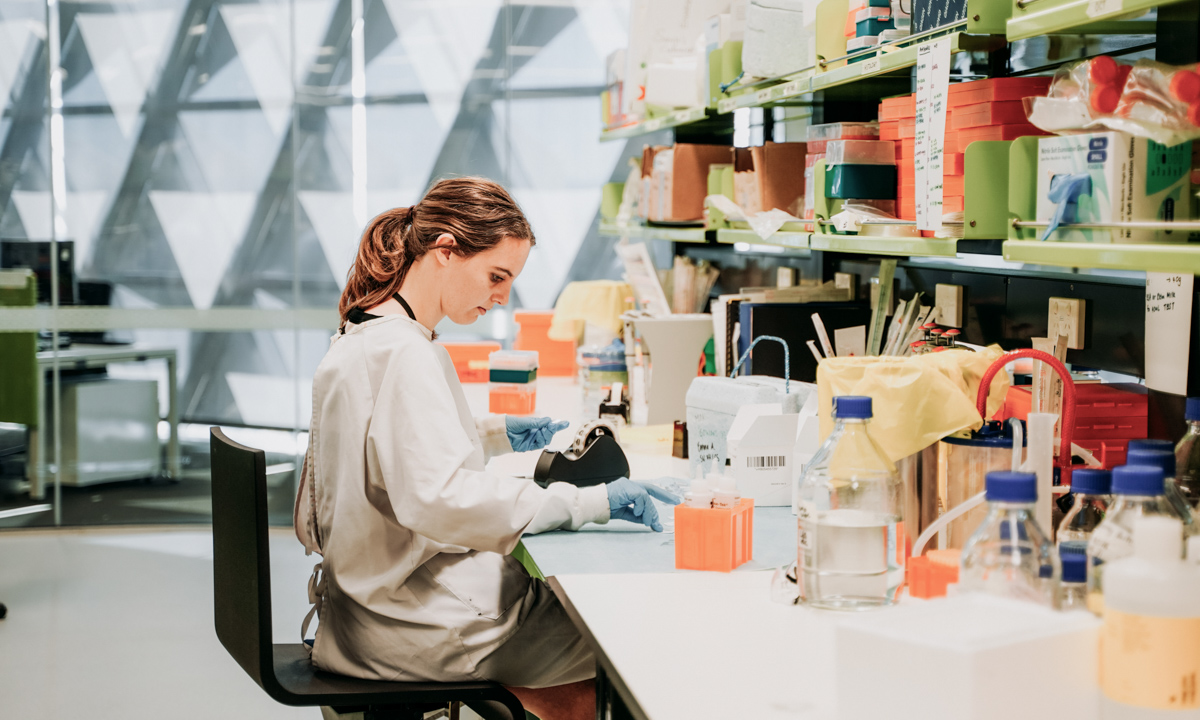
This image: Meaghan Coles
A better start for babies
Dr Karen Best is a midwife and Senior Research Fellow in SAHMRI’s Women and Kids Theme. Her work in understanding the best nutrition for pregnant women sees her divide time between SAHMRI and the Women’s and Children’s Hospital.
“I love being part of SAHMRI,” says Karen, who sits on Level 7 in the building.
“We’re all working to improve the health of the community, and you can feel that in the place.”
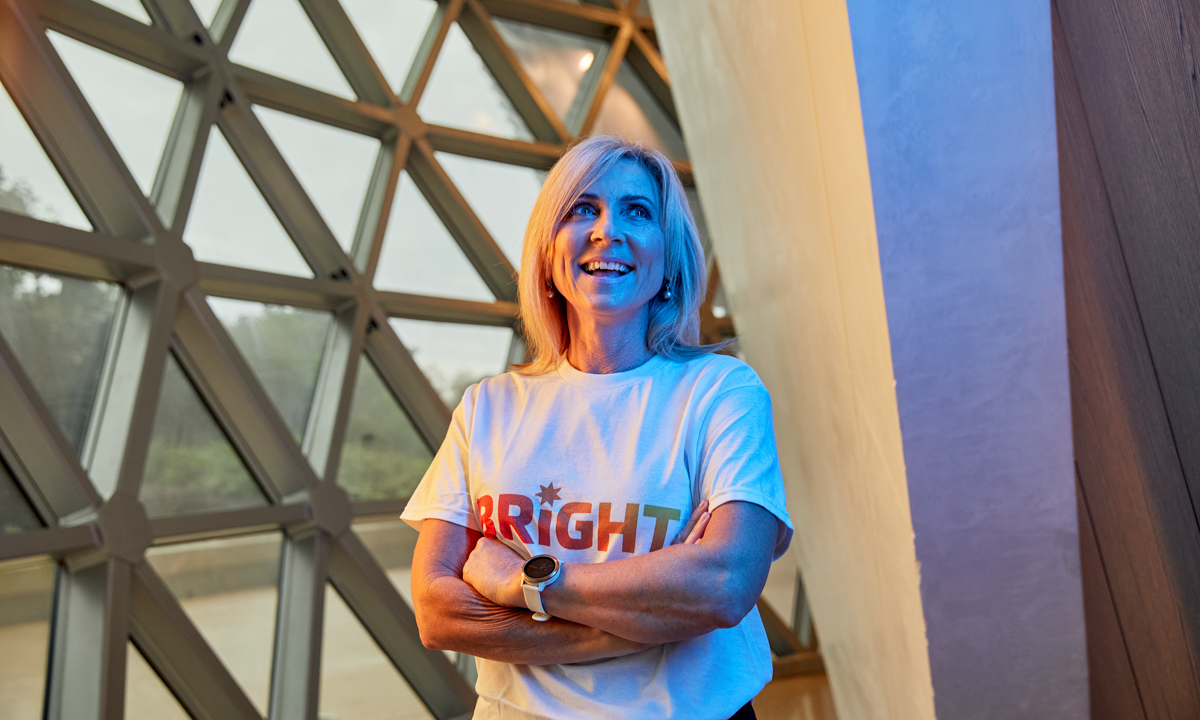
Karen Best
Read more about Karen Best’s work here.
Karen’s recent research has focussed on a type of fat called omega-3, which is found in oily fish, walnuts and other foods.
“We found a dietary supplement of omega-3 in women who had low levels could reduce the risk of preterm birth,” Karen explains.
Pre-term birth can result in developmental problems for babies and is often distressing for families. The requisite support and healthcare is costly.
Karen’s research has created a positive change, with pregnant women in South Australia now offered an omega-3 blood test as part of their standard pre-natal care.
Grab an esky, into the car
Research at SAHMRI never exists in isolation. It involves collaboration across many different areas of expertise and is connected to other arms of South Australia’s health system.
Dr Samira Khabbazi’s role as Tissue Collection Coordinator in SAHMRI’s Precision Cancer Medicine Theme keeps her on the move.
“My desk is on Level 5 at SAHMRI, but when I get a call from the nurses I grab my esky and ice, go down to my car and head off to St Andrew’s hospital to pick up samples,” Samira says.
“Sometimes I’m in and out of the SAHMRI building four times a day.”
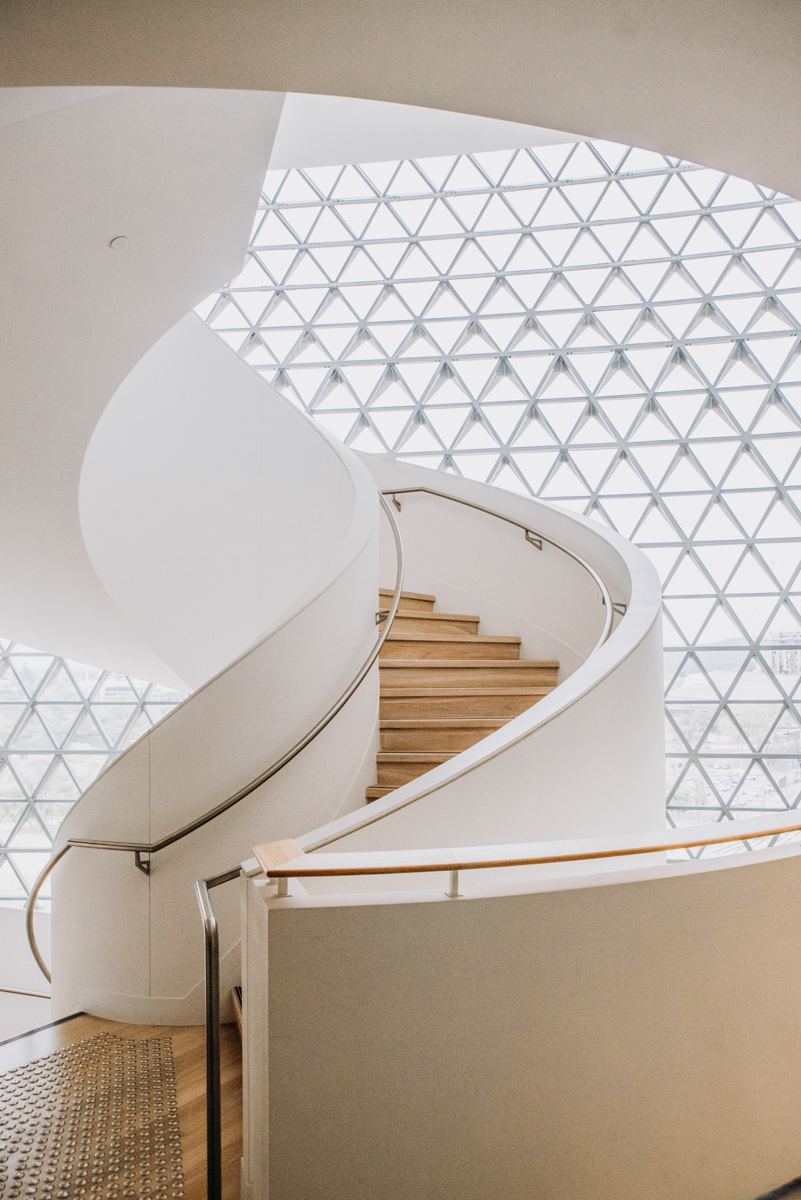
This image: Meaghan Coles
Read more about Samira Khabbazi’s work here.
Samira’s job is a vital part of research aimed at understanding and treating prostate cancer. She works as part of a national project called the Australian Prostate Cancer BioResource.
“Men who are having prostate surgery provide consent for us to use samples of their blood and tiny pieces of their prostate tissue in this research,” Samira says.
Prostate cancer is the most common cancer diagnosed in South Australian men, with more than 1300 new cases every year.
“Our results have already led to several clinical trials of new therapies for prostate cancer,” says Samira. “The project is a great collaboration between researchers, patients, nurses, surgeons and pathology services that we hope will make a real difference for men with prostate cancer.”
Samira’s husband is also a researcher in the SAHMRI building, studying blood vessels in health and disease up above, on Level 6 in the Lifelong Health Theme.
Together they juggle raising a young son with their busy schedules.
“We’re lucky to have a childcare spot in the city, so it works,” smiles Samira.
Zoom is my best friend
SAHMRI researchers use digital technologies to connect their work with the people who will benefit from it: the general public.
As co-lead of the Adolescent Health Group in Wardliparingga, SAHMRI’s Aboriginal Health Equity Theme, Seth Westhead works with Aboriginal and Torres Strait Islander young people aged
10—24.
“We’re using online surveys and focus groups to understand what Indigenous young people really want and need to support their health and wellbeing,” says Seth. “We find they engage really well using online platforms.”
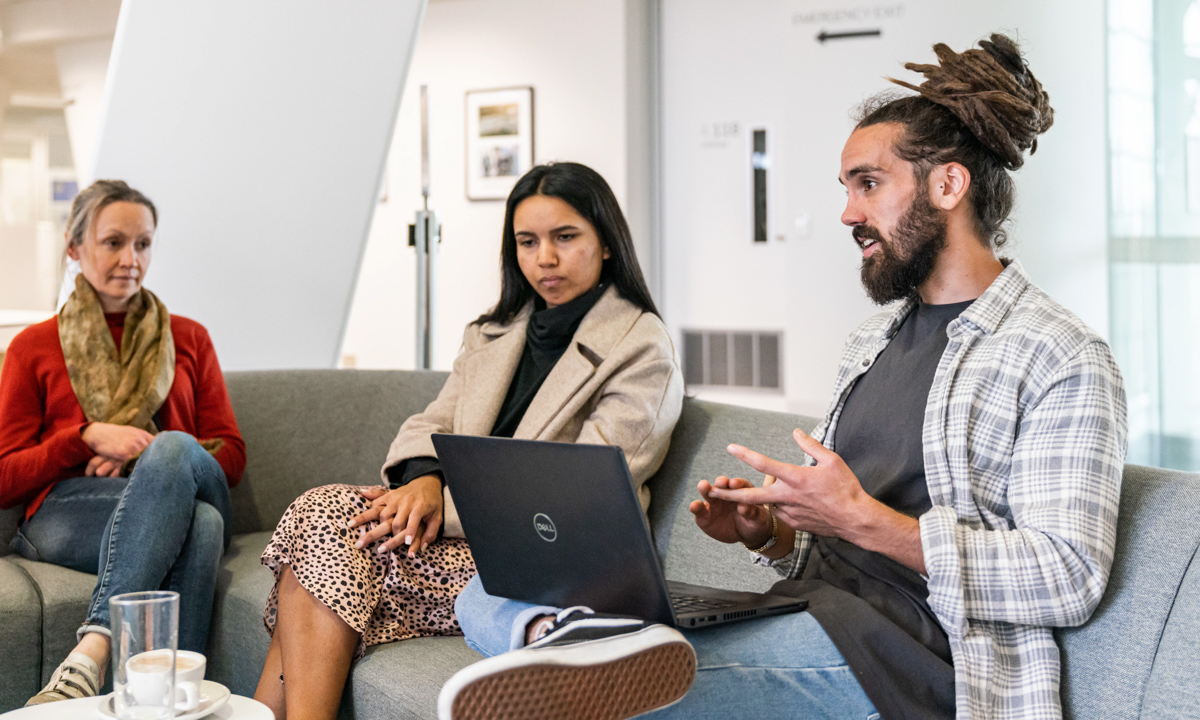
Seth Westhead
Read more about Seth Westhead’s work here.
Seth and the Adolescent Health team at Wardliparingga are leading the development of the first national strategy for Aboriginal and Torres Strait Islander adolescent health.
“It’s important to focus on this age group so we can provide support to young people before a health crisis or chronic disease have a chance to become established,” says Seth.
“But marching in and trying to tell them what they should and shouldn’t do won’t work – young people have to be a part of the process.”
This project is just one of the reasons Seth and his colleagues at SAHMRI are in regular communication with other Indigenous research leaders across Australia and internationally.
“Zoom is my best friend,” laughs Seth.
SAHMRI is a unique, independent research institute focussed on improving health for every South Australian.
Every day, SAHMRI researchers work closely with each other, the state’s health services, national colleagues and the world’s best experts to tackle the biggest health issues across the human lifespan.
You might catch a glimpse of them hurrying about next time you walk past the SAHMRI building.

Health and medical research for impact, not profit
SAHMRI is South Australia’s independent, not-for-profit health and medical research institute.
The researchers inside SAHMRI are right here in our community, working on the most critical health and medical issues we face today.
They’re making extraordinary progress, but need the community’s help to turn their discoveries into cures, treatments, better health and longer lives.
Income from research grants alone is not enough to bring research to completion.
That’s why SAHMRI needs donations to bring the benefits of world-class health and medical research home to South Australians.
Please donate today at sahmri.org.au/donate
SAHMRI research has got you covered
SAHMRI’s research portfolio addresses four main focus areas:
Precision Cancer Medicine
- Delivering the right cancer treatment for the right person at the right time
- Focus on leukaemia, myeloma, bowel, prostate, paediatric brain cancers and other cancers
SAHMRI Women and Kids
- Giving our kids the best start in life
- Focus on pregnancy, birth, disability, allergy and family life
Lifelong Health
- Targeting the most significant health challenges across our lifespan
- Focus on heart and gut disease, diabetes, men’s health and mental health, wellbeing, stroke and dementia
Aboriginal Health Equity (Wardliparingga)
- Addressing health inequity through Australia’s largest dedicated Indigenous health research unit
- Focus on optimising health and wellbeing in Aboriginal and Torres Strait Islander communities
SAHMRI is also home to essential resources and infrastructure that service South Australia, including technology and tools to support research and produce diagnostics, registries to track health data and trends, and centres to translate research into policy and effective health responses, including for COVID-19.



